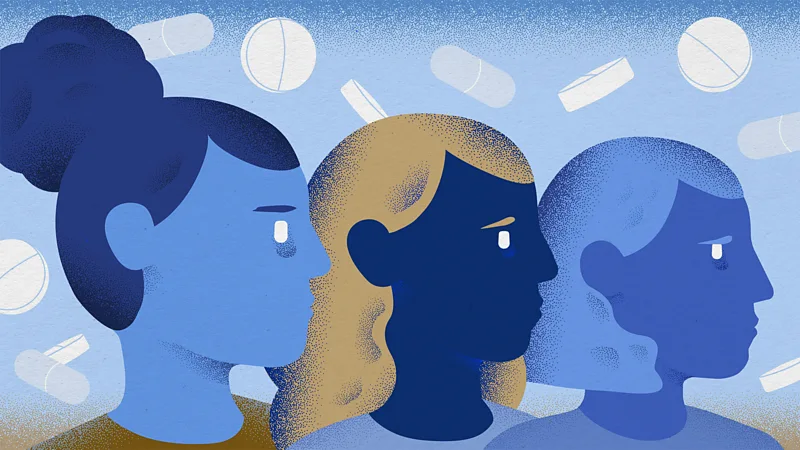Can the pill really make women more anxious?
Some women are concerned about how contraceptive pills could be affecting their mental health. Are these fears backed up by evidence?

Like many young women, Sarah E Hill spent her late teens and most of her twenties on the contraceptive pill. "I never thought twice about it," says Hill, now a researcher who teaches evolutionary psychology at Texas Christian University, an institution affiliated with the Christian Church (Disciples of Christ) in the United States. It was only when she switched contraceptives, 12 years after starting to take the pill, that an epiphany dawned on her.
"My life felt brighter and more interesting, like I had walked out of a 2D black-and-white movie into a full-colour, 3D, meaning-filled reality," says Hill. Her experiences of taking oral contraceptives inspired her to study the science involved and publish a book, How the Pill Changes Everything, in 2019.
In recent years, many women have become concerned about the pill's side effects, particularly on their moods and mental health. In fact, there has been a growing backlash – one which is most evident on social media where hashtags like #quittingbirthcontrol have drummed up millions of views. This is thought to partly explain why the pill has been suffering a popularity crisis of late.
Prescription figures are falling in many developed countries: England's Sexual and Reproductive Health services reported that the uptake of oral contraceptives had fallen from 39% in 2020-2021 to 27% in 2021-2022. Meanwhile, American pill-users dropped from 31% in 2002 to 24% between 2017 and 2019, while Canada and Australia reported pill use tailing off from 23% to 11% from 2006-2016 and 2008-2016, respectively.
In addition to discussing legitimate concerns, social media influencers have been spreading misinformation about the contraceptive pill's side effects, both mental and physical. While they may have no medical background, some are even encouraging women to abandon contraception altogether – a trend which some experts believe could be behind a recent spike in abortions in the UK.
But can the pill really alter one's personality and outlook on life? Can it contribute to serious mental health conditions such as anxiety and depression, or even lead to suicide, in extreme cases?
A slow response
The answer, it appears, isn't clear-cut.
When the pill made its debut in the US in 1960, it amassed a whopping 1.2 million users within two years. The tiny beige tablets marked a revolutionary new birth control, hailed by women as a symbol of sexual liberation and female empowerment, freeing them from fear that an unwanted pregnancy would derail their careers or degrees.
Today, oral contraceptives are the go-to choice for some 150 million women around the world, or roughly 16% of the global contraceptive-taking population, with a failure rate of only 1% (or 9% when you factor in human error such as forgetting the occasional dose). The failure rate of a contraceptive is defined as the number of unintended pregnancies that would occur if 100 women used that method for a year.
There are two types of contraceptive pill, and both are made up of artificial sex hormones. First, there's the most popular kind, the combined pill, which contains synthetic versions of oestrogen and progesterone. The other is the progestogen-only pill, or "mini-pill". Both work to prevent pregnancy in a handful of ways, including suppressing ovulation and thickening the cervical mucus to make it harder for a sperm to penetrate and reach an egg.
However, the hormones in oral contraceptives don't just affect the body, they can also have powerful effects on women's brains.
"The impact of hormones on the brain is complicated," says Johannes Bitzer, an obstetrician-gynaecologist (OBGYN) and psychotherapist at the University Hospital Basel in Switzerland. "For some individuals, the pill has a positive effect on mental well-being. In others, it may cause irritation and even anxiety."
Medical warnings, for the most part of the pill's 65-year history, have been scant. Some sexual health providers in the UK and the US make no mention whatsoever of the mental side effects of the pill on their websites.
"I think the big issue is that in OBGYN training, mental health is not a subject. It's for the psychiatrists," says Bitzer, who has been in the field for nearly 40 years. Things are slowly changing, but "before, when we discussed the pill, we talked about thrombosis, cancer, irregular bleeding, weight gain, and so on. The issue of mental health was more or less excluded," he says.
There hadn't been much investigation into potential mental side effects from researchers, either. But a shift started taking place in 2016, says Bitzer, when a group from Denmark published a seminal paper on the topic, leading to more research in the years after.
In the original Danish study, researchers dug into the country's national health database to track the mental health of over a million women aged between 15 and 34 over a period of 14 years. They discovered that women who started taking the combined pill were 70% more likely to be prescribed antidepressants six months later, as compared to those who had never taken oral contraceptives. For those starting on the mini-pill, the risk was 80%.
In 2023, a separate group of researchers gleaned similar results when they analysed the health records of a quarter of a million women in the UK Biobank, a large repository of genetic and medical information. Pill-users, they found, were 71% more likely to be depressed compared with never-users, two years after beginning their contraceptive.
"There's a convincing temporal association between starting use of these products and then developing depression symptoms," says Øjvind Lidegaard, a medical epidemiologist specialising in obstetrics and gynaecology at the University of Copenhagen, who led the Danish study.
However, both of these studies were "cohort studies", conducted by analysing the data of large groups of women, and comparing the mental health outcomes of those who were taking oral contraceptives with those who weren’t. This means they were able to identify if there was an association between these two things, but not unravel whether there was cause and effect. There could, for example, be some pre-existing differences between the groups of women that affect the results.
Conflicting results
Some studies seem to contradict the correlation between certain mental health conditions and oral contraceptive use. For instance, when researchers at Ohio State University reviewed 26 earlier studies, they found only a "minimal" link between progestogen-only methods of contraception and depression. Separately, in two clinical trials, each involving between 200 and 340 women in Sweden, researchers concluded that the combined pill didn't lead to depression or worsening mood.
Intriguingly, taking a "break" from oral contraceptives – as is required for seven days each month with many types of the combined pill – can lead to mood worsening, according to some findings. In a 2023 study involving 120 pill-taking women in Austria, some of whom were long-term users, participants reported feeling a 7% increase in anxiety during their pill pause, as well as a 13% and 24% rise in negative feelings and mental health symptoms, respectively.
"So from a mental health perspective, it might be more beneficial for contraceptive users to go for continuous use," says Belinda Pletzer, a cognitive neuroscientist at the University of Salzburg, who is leading an EU-funded project to study the effect of hormonal contraceptives on the female brain.
Pletzer doesn't discount the fact that some women do suffer poorly, psychologically speaking, when on the pill, and that these symptoms should be taken seriously. "But it's just a small percentage of women," she says.
One reason to explain the vast discrepancy in study findings on the mental side-effects of oral contraceptives is quite simply the nature of what's at hand, says Helena Kopp Kallner, an OBGYN at Danderyd Hospital near Stockholm in Sweden. Namely, that mental health conditions are often measured subjectively, and are notoriously difficult to study. Add to that that there are many different pill types (over 30 brands of the combined pill exist), so often scientists might end up comparing apples to oranges, she says. The different studies also use varying methodologies, she says.
What researchers look for at the end of their study also affects their findings, adds Bitzer. In the Danish study, for instance, "the fact that you get prescribed antidepressants is not necessarily related to a diagnosis of depression, but to the practice of the doctor, which makes your outcome measure quite problematic", he says.
It's also hard to prove cause-and-effect relationships from such observational studies, says Sofia Zettermark, a physician based in Gothenburg, Sweden, because there could be other factors – such as genetics and one's environment – that may influence the results. For example, when she analysed the health records of nearly a million women in the national Swedish registries, she discovered that women from low-income and immigrant backgrounds were more sensitive to experiencing mood changes on hormonal contraception.
Lidegaard, for his part, clarifies that his study must be understood in the wider context. "There's no doubt that some women who start using hormonal contraception experience severe changes in their mental health," says Lidegaard. "However, it's important to realise that it's only 7 to 8% who face so many mental incidences that they are forced to stop taking their medication...The majority of women taking these products don't feel any severe discomfort mentally."
And of course, for some women the benefits of oral contraceptives may outweigh any side-effects. In addition to providing highly effective contraception, the combined and mini-pill can have other positive physical effects. "If you have endometriosis, heavy bleeding, or PMDD [premenstrual dysphoric disorder, an extreme and debilitating form of PMS], then the pill can actually help improve it," says Kopp Kallner.
Pregnancy itself can also involve significant health complications, particularly in the developing world. Meanwhile, several studies have found a link between unplanned pregnancy and a higher risk of depression.
Altering brain chemistry
But where there are impacts on mental health, how exactly does this happen?
There are many ways that oral contraceptives might be able to interfere with women's moods.
One side-effect of the contraceptive pill is that it affects the production of natural oestrogen and progesterone, hormones which have potent roles in the brain including cognition as well as neuroprotective effects, modulating blood flow, inflammation, and signalling.
Instead, combined and mini-pills, as well as hormone replacement therapy (HRT), contain synthetic versions of these hormones which disrupt the natural progression of the menstrual cycle. This includes progestins, a group of artificial progestogen hormones that can be manufactured in a variety of ways, though the majority are made from testosterone. Neither synthetic oestrogens or progestins are chemically identical to the hormones naturally produced by the body.
This is thought to have a number of consequences. One is that, in women who are taking the contraceptive pill, pathways involving the neurotransmitter serotonin – which is often described as the brain's natural "mood-booster" – might be disrupted.
In one study, a group of Danish researchers analysed brain scans of 53 healthy women, 16 of which were taking oral contraceptive pills, to assess the activity of the serotonin system. They found that the women using oral contraceptives had 9-12% lower levels of a certain type of serotonin signalling compared to the women who were not taking these drugs.
The effect was twice as large as the impact that selective serotonin reuptake inhibitor (SSRI) antidepressants are known to have on this particular kind of signalling. The researchers speculated that this might be the mechanism responsible for the link between oral contraceptives and depression.
There's also some evidence that the artificial oestrogen and progestins present in oral contraceptives might interfere with the production of allopregnanolone, another hormone with crucial roles in the brain – particularly the regulation of mood and the body's stress response. A pharmaceutical version of this hormone was approved in the US in 2019 for the treatment of post-natal depression.
In women who are not taking artificial sex hormones, progesterone can be converted into allopregnanolone. But in women using the contraceptive pill, this process is thought to be disrupted: progestins don't get broken down into allopregnanolone, meaning they may miss out on some of its anti-anxiety and antidepressant effects.
In one study conducted in rats, those taking oral contraceptives had lower concentrations of allopregnanolone in the brain. In another study in rats, this reduction was found to be linked to a reduction in social behaviour and sexual motivation – side effects which the authors speculated might be relevant to women taking oral contraceptives. However, the results of animal studies do not always translate into humans.
Making matters worse, the pill can mess up a woman's stress response, possibly leading to anxiety and depression. "What researchers have found is that you get a blunting of the cortisol response to stress that most naturally cycling women experience," explains Hill. "No cortisol equals no stress, which might sound like a good thing on the surface. But that's not how it works – cortisol isn't what causes stress, it's how our body helps cope with and recover from stress."
Adolescent risk
There's one group in particular that Lidegaard worries about: teenage girls. His study revealed that those aged between 15 and 19 were almost twice as likely (1.8 times) to receive an antidepressant prescription after starting the combined pill compared to those who did not take the pill. For those on the mini-pill, the risk was more than double (this group was 2.2 times more likely to be prescribed antidepressants than those who did not take the pill).
Similarly, Zettermark's study found that adolescent girls displayed the strongest association between hormonal contraceptives and antidepressant and anti-anxiety medication use. Those aged 12 to 14 were 240% and 190% more likely to be prescribed the drugs within a year of starting the combined pill and mini-pill, respectively; or 52% and 83% if they were between 15 and 17 years old.
In another study, based on the data from 264,557 women invovled with the UK Biobank, researchers found that those who had taken oral contraceptives at some point in their lives had a higher risk of developing depression over their lifetime, but the risk was most pronounced during the first two years of use.
Apart from adolescents, there's another group many physicians are wary of prescribing oral contraception to. "If you have been depressed previously, have recurrent depressions, or any psychiatric issues at all, you have an increased risk of feeling depressed on the pill," cautions Kopp Kallner.
Experts such as Kopp Kallner say self-awareness is key – you should monitor your mood for a few months when you first start the pill, or switch from one brand to another. If you have concerns about how your contraception is affecting your mood, arrange to speak to your healthcare provider. With so many different types of progestins, and combinations of these with artificial oestrogen, not to mention the different doses and preparations, finding the right fit is "a little bit of an art," says Bitzer. "It's very much individualised treatment."
However, there are many other types of contraception available that either do not involve hormones or contain lower doses than oral contraceptives, including male and female condoms (which can also help protect against sexually transmitted diseases), the vaginal ring, the IUS (the hormonal coil), the IUD (the copper coil), and sterilisation.
For Hill, changing the method of contraception she used was life-altering. "Take the time to find a mode of pregnancy protection that makes you feel like the person you want to be," she advises. "With time, patience, and self-compassion, you will be able to find something that works for you."
-BBC







